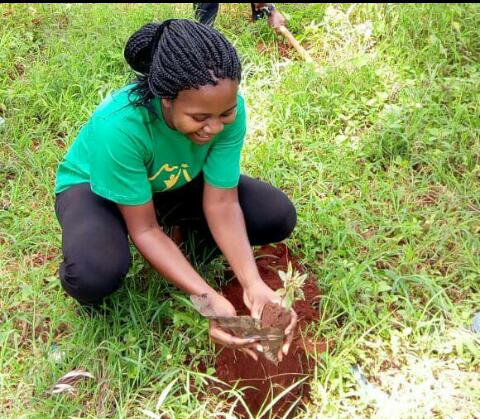Girls and Climate Change
When I first learned of the concept of climate change, it struck me as a phenomenon that was far removed from me, or my life as was. After all, I live in Africa, Kenya specifically, where we do not experience extreme weather upheavals such as typhoons, wildfires, frozen lakes and
hurricanes. I associated climate change with such occurrences, and even thanked God for blessing my country with only the problems we could handle- drought and the occasional flooding. Reality hit home harder than I could have anticipated, and when I say home, I do mean
home.
Soon, the rain season patterns became unpredictable and my family went through the first season (at least since 1994) of significantly reduced yields and accompanying hunger. See, I come from Kakamega County, a region in Western Kenya that relies heavily on agriculture for both subsistence and commercial purposes. My mother plants maize that we use for ugali flour as well as other crops that we sell in the market. Like most rural villages, we do not utilize advanced farming techniques and instead rely on the rains, the sun and a bit of traditionally made manure. We planted maize twice in a year, with the second season always expected to have the highest yields that provide food to last the family until the next harvest. Due to climate change, the rains that were expected in January arrived in March, periods of heavy rains turned to short sporadic rains and the sun became hotter than usual. Crop yields became considerably minimal as the weather conditions we relied on became neither predictable nor sustainable.
Girls, or better yet women, face a higher burden arising from these changes as a result of the ingrained role as the family caretaker. In most African families such as the one I grew up in, the women are responsible for general care of the family including food and wellbeing. My mother, for instance, had the responsibility of ensuring that her six children always had food, while my father dealt with more ‘serious’ issues such as school fees. The effects of the climate crisis, therefore, hit the women harder as they are caused to become more vulnerable to the conditions of their livelihoods.
families such as the one I grew up in, the women are responsible for general care of the family including food and wellbeing. My mother, for instance, had the responsibility of ensuring that her six children always had food, while my father dealt with more ‘serious’ issues such as school fees. The effects of the climate crisis, therefore, hit the women harder as they are caused to become more vulnerable to the conditions of their livelihoods.
The effects of the global crisis on girls and women go beyond its effect on food availability.
The United Nations terms the climate crisis as ‘not gender neutral’ as women and girls experience it way more than the men, an occurrence that further amplifies the already existing inequalities between men and women. To begin with, the climate crisis has resulted in a loss of homes being lost to sudden disasters such as cyclones and even slower disasters such as droughts. This increases the risk of violence against girls and women as they scamper for shelter as well as food. In the case of such disasters, the threat against women and girls is multiplied as they become increasingly vulnerable to issues such as gender based violence, sexual exploitation, child marriages, limited access to healthcare and limited access to resources. In traditional African settings, the family will turn to marrying off their young girls in exchange for food and some wealth such as livestock given as dowry. Attending schools in such cases becomes a foregone reality as when given the choice between staying fed and getting education, the former
will always be the choice.
In villages such as my own where we are lucky enough not to experience the sudden climate related disasters, the slower onset disasters still disproportionately affect the women. Agriculture, in this case, is the main employment avenue for girls and women, whether they are
working on their farms for their family’s subsistence use, working on another’s farm to gain income or selling agricultural produce. The prevailing periods of drought and erratic rainfall affect women’s ability to gain resources or an income, forcing young girls to drop out of school
to support their mothers or mothers to seek out risky alternatives.
Given the acute intersection between the impacts of climate change and women and girls, it is imperative that this population group be actively involved in efforts aimed at curbing the crisis. After all, who has more to benefit from dealing with climate change than he (or in this case she) who is most affected by its effects?
By Auma Gertrude
